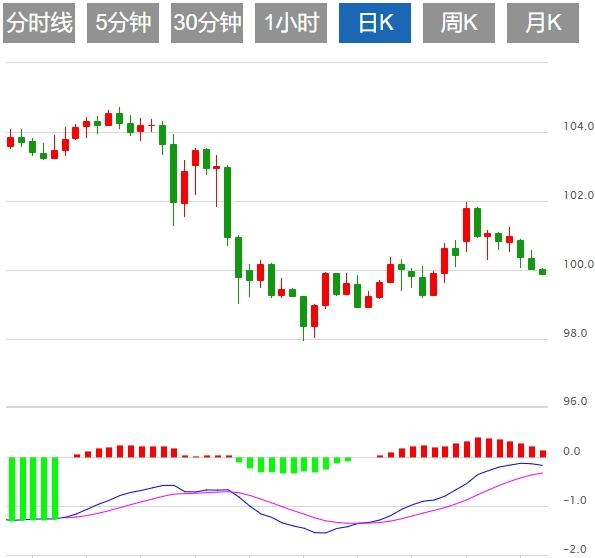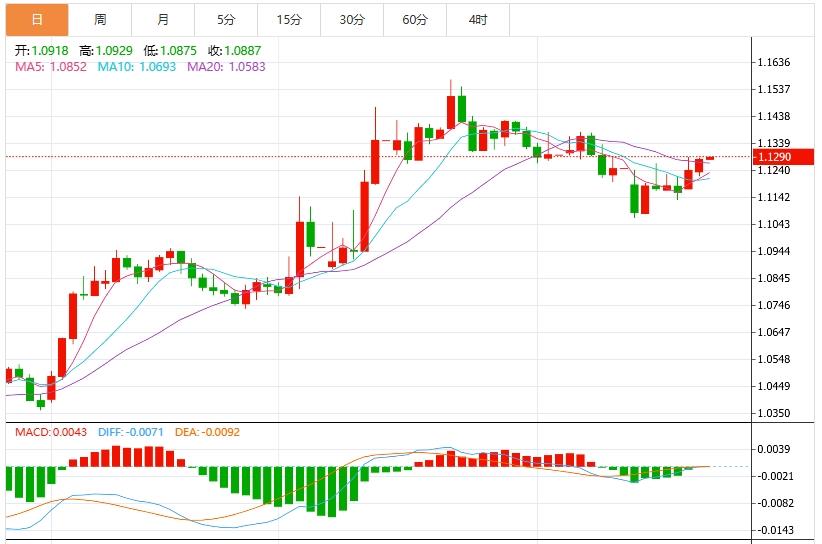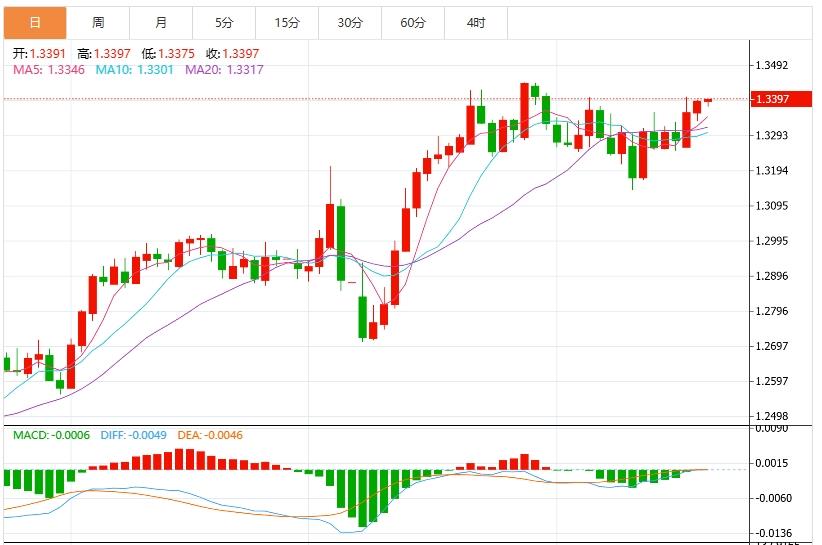Wonderful introduction:
Spring flowers will bloom! If you have ever experienced winter, then you will have spring! If you have dreams, then spring will definitely not be far away; if you are giving, then one day you will have flowers blooming in the garden.
Hello everyone, today XM Forex will bring you "[XM Group]: The US dollar index fell below the 100 mark, the market is paying attention to the UK inflation data." Hope it will be helpful to you! The original content is as follows:
On Wednesday, the US dollar index hovered around 99.91, falling below the 100 mark. The dollar fell 0.35% on Tuesday, hitting the 100 mark. Economic data on this trading day are relatively small. Investors mainly pay attention to news related to the US tax reform bill, news related to geopolitical situation, and the speeches of Federal Reserve officials and changes in the international trade situation.
U.S. dollar: As of press time, the US dollar index hovered around 99.91, and the US dollar index lost some glory on Tuesday. Problems with credit value and safe-haven status due to credit rating downgrades and the possibility that President Trump will abandon any attempt to further end the Russian-Ukrainian war are seen as another unreliable factor. The fact that the Trump administration may shift or even reverse on any issue will affect traders’ sentiment when considering how to deal with the dollar. Judging from the daily line structure, the US dollar index has fallen below the Bollinger Band middle track (100.1528), and is under pressure in the short term at the 50-day moving average (101.5138), indicating that short positions dominate.



Feder Cleveland Fed Chairman Hamake and San Francisco Fed Chairman Daly said Tuesday evening local time that given the uncertainty of the Trump administration's policy impact, the best way for the Fed now is to wait and then make any further policy decisions. When the two local Fed chairmen appeared together at the Atlanta Fed meeting, they reiterated that it is difficult to judge the direction of the economy because trade policy has not yet been determined, so it is difficult to know how monetary policy should respond.
Foreign media reports said that British Finance Minister Reeves will hold talks with US Treasury Secretary Becent this week, and the two countries will continue to finalize details of the agreement on reducing tariffs imposed by the Trump administration. The two will speak during the G7 Finance Ministers' Meeting in Banff, Canada on Wednesday. This will be the first offline discussion between Reeves and the U.S. Treasury Secretary since the United Kingdom and the United States announced the outline of the trade agreement earlier this month. The deal was praised by Trump as "complete and comprehensive", although the agreement outline covers only limited industries and the 10% benchmark tariff in the United States has not wavered. Among them, tariffs in the UK's automobile and steel industries have been cut. However, the agreement does not specify when the tariff cuts will take effect, nor does it provide critical details such as the size of UK steel export quotas, and the U.S. security requirements for UK steel mill ownershipnature.
According to a White House official, Trump will jointly announce in the Oval Office on Tuesday afternoon local time with Defense Secretary Hegseyth to allocate $25 billion for the "Golden Dome" missile defense project. The funding is only a small part of the huge expenses required for the project in the end. The official said this aims to set a preliminary framework for the still-early stage conception of the "Golden Dome". The idea is to create a nationwide air defense network through sensor, satellite and missile defense batteries spread across the United States. The funds have now been included in Trump's "Beautiful Great Act" package. Earlier today, Trump discussed the plan during a meeting with House Republicans. It is reported that the $25 billion in initial funding is consistent with the White House’s request in the previous package of bills, but the bill has not been passed by Congress. The U.S. Congressional Budget Office estimates that the cost of building a complete national ballistic missile and cruise missile defense system will exceed $500 billion over the next 20 years.
According to the Financial Times, the EU plans to impose a unified fee on billions of small parcels entering the EU, which is another blow to online retailers such as Temu and Shein. Under pressure from member states, the European Commission circulated a draft proposal on charging handling fees on Monday. Customs agencies in these countries are being overwhelmed by up to 4.6 billion imported parcels sent directly to residents' homes each year. The proposal seen by the Financial Times does not set a fee standard, but people familiar with the European Commission's ideas say the fee standard will be around 2 euros. Some of this money will be used to pay customs fees, but it will also be included in the EU budget, bringing it billions of euros in revenue each year.
ECB Regulatory Commission Eskriva warned on Tuesday that geopolitical and trade tensions caused by U.S. tariffs pose risks to the stability of the global financial system and global economic growth. Eskriva believes that the unpredictability of Trump administration policies, from trade to a broader economy, is one of the risks that define the global environment, and the "possible deterioration of international investors' confidence in the U.S. economy" also creates uncertainty. All of these factors have a decisive impact on the global growth prospects and pose a risk to the stability of the international financial system. Eskriva cited an analysis of several situations that raising tariffs would have a negative impact on global economic activity, especially in the United States, with less impact on the eurozone and Spain. He still believes that Spain faces significant downside risks in the coming quarters in an uncertain environment.
Mitsubishi UFE analyst Derek Halpenny said in a note that the yen should continue to be supported as the Bank of Japan signals still tend to raise interest rates further, while other G10 central banks are cutting interest rates. "Even if the Bank of Japan does not eventually raise interest rates, it is unlikely to resume monetary easing, which will continue to support the yen." Meanwhile, U.S. Treasury Secretary Becent Becent and Japanese Finance Minister Katsunobu Kato will meet this week to discuss issues including foreign exchange. Halpenny said Becent believes that the Bank of Japan's monetary policy has caused the dollar to be overvalued, a view that may curb the Bank of Japan's willingness to cut interest rates.
Mitsubishi UF analyst Derek Halpenny said in a report that if the UK's inflation data released on Wednesday exceeded expectations, the pound may rise briefly. A survey of analysts showed that inflation is expected to accelerate to 3.3% year-on-year from 2.6% in March. In April this year, with the increase in other taxes, the increase in employer national insurance contributions also began to take effect. Energy prices and other utilities expenses have also risen. Halpenny said people might breathe a sigh of relief if inflation meets general expectations. More than expected inflation could boost the pound, though negative growth could mean that the impact could fade rapidly.
"Although we believe that the United States may avoid a full recession this year, slowdown in growth and weak labor market may prompt the Fed to resume interest rate cuts in the next few months." The Office of UBS Wealth Management Investment Director said on May 20 that the benchmark scenario is expected to be that the Fed may start interest rate cuts this year in September, with the full range of 75 basis points. It said that although it may have passed the peak of pessimism caused by Trump's trade policy, continued uncertainty may still exacerbate market volatility. Current bond yields are at relatively high levels, helping to seek lasting income. Historically, as the holding period extends, the probability of bonds outperforming cash will increase. Therefore, the view that high-rated and investment-grade bonds are "attractive" and such bonds are expected to achieve medium single-digit returns in the next 12 months.
The above content is all about "[XM Group]: The US dollar index fell below 100 mark, the market is paying attention to British inflation data". It was carefully compiled and edited by the editor of XM Forex. I hope it will be helpful to your trading! Thanks for the support!
Only the strong know how to fight; the weak are not qualified to fail, but are born to be conquered. Step up to learn the next article!